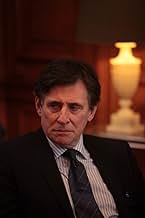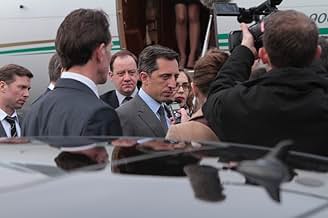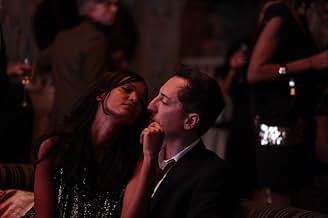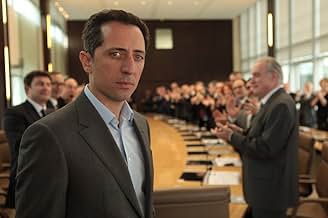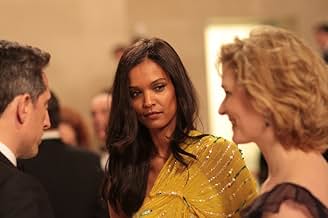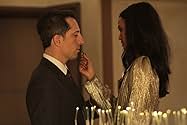IMDb RATING
6.5/10
5.7K
YOUR RATING
The newly appointed CEO of a giant European investment bank works to hold on to his power when an American hedge fund company tries to buy out his company.The newly appointed CEO of a giant European investment bank works to hold on to his power when an American hedge fund company tries to buy out his company.The newly appointed CEO of a giant European investment bank works to hold on to his power when an American hedge fund company tries to buy out his company.
- Awards
- 1 win & 2 nominations total
Featured reviews
If there is one message that the movie is trying to communicate to its audience it's the above title.
There are of course reviews that point out the alleged likeliness of this film with movies like "Wall Street" usually concluding "that there is nothing new to see". Under closer examination however, any similarities between the two films go only skin-deep and can only be considered superficial. There are fundamental differences between these two movies because they represent two different approaches and evaluations of the same issue and which one hits home is up for you to decide. And thats because "Wall Street" focuses on the seducing power and aloofness of a loan shark that acts as a money fueled lone wolf, as opposed to the naiveness of a young rookie which is slow to disillusion himself about his own actions while he's getting carried away (but eventually comes out on top etc). The caveat of such scenarios is in that they constantly, silently and almost purposefully marginalize the inherent, all consuming, self-perpetuating environment and ill-conceived culture that money in and all by itself creates, even for "the winners of the game".
La Capital on the other hand has none of the above shortcomings when it comes to describing the black hole lurking deep into the very foundations of our culture: Money. It's a film about attitudes and value systems across the board, with a scenario that's free of cliché good-guy-vs-bad-guy dualities and with the courageous nerve to "pull no punches" sparing its viewer from having to suffer another stereotypical "happy ending" made-in-Hollywood (has elements of it but still its not "right into your face").
Finally, I would just like to add that, all in all, Mr Gavras is right in that there will come a time in the not so distant future ... A time in which, among other things, our western culture will look back to the contemporary intellectuals and artists to examine which ones did of their duty in terms of articulating the public opinion, bringing the spotlight on the machinations of the financial system and the corrosive effects that money in and all by itself has both on our societies as a whole, in our own micro-worlds and those of our acquaintances as well as our own fragile, individual psyches. And when this time comes I think that the memory of both Mr Gavras and those that stood by him in this and similar projects will be, if not exalted, then at the very least spared from the outrage of the dystopian poverty-striken masses.
There are of course reviews that point out the alleged likeliness of this film with movies like "Wall Street" usually concluding "that there is nothing new to see". Under closer examination however, any similarities between the two films go only skin-deep and can only be considered superficial. There are fundamental differences between these two movies because they represent two different approaches and evaluations of the same issue and which one hits home is up for you to decide. And thats because "Wall Street" focuses on the seducing power and aloofness of a loan shark that acts as a money fueled lone wolf, as opposed to the naiveness of a young rookie which is slow to disillusion himself about his own actions while he's getting carried away (but eventually comes out on top etc). The caveat of such scenarios is in that they constantly, silently and almost purposefully marginalize the inherent, all consuming, self-perpetuating environment and ill-conceived culture that money in and all by itself creates, even for "the winners of the game".
La Capital on the other hand has none of the above shortcomings when it comes to describing the black hole lurking deep into the very foundations of our culture: Money. It's a film about attitudes and value systems across the board, with a scenario that's free of cliché good-guy-vs-bad-guy dualities and with the courageous nerve to "pull no punches" sparing its viewer from having to suffer another stereotypical "happy ending" made-in-Hollywood (has elements of it but still its not "right into your face").
Finally, I would just like to add that, all in all, Mr Gavras is right in that there will come a time in the not so distant future ... A time in which, among other things, our western culture will look back to the contemporary intellectuals and artists to examine which ones did of their duty in terms of articulating the public opinion, bringing the spotlight on the machinations of the financial system and the corrosive effects that money in and all by itself has both on our societies as a whole, in our own micro-worlds and those of our acquaintances as well as our own fragile, individual psyches. And when this time comes I think that the memory of both Mr Gavras and those that stood by him in this and similar projects will be, if not exalted, then at the very least spared from the outrage of the dystopian poverty-striken masses.
Marc Tourneuil (Gad Elmaleh) is an ambitious executive of the French Phenix Bank. When the CEO becomes incapacitated with cancer, he handpicks Tourneuil as the replacement CEO. He's surrounded by enemies. When he starts pushing to be more than a figurehead for the old CEO, he even loses that support. The only support comes from an American hedge fund minority shareholder Dittmar Rigule (Gabriel Byrne). The problem is that his support comes with strings attached. There is also underwear supermodel Nassim that has caught the eye of the married Tourneuil.
This starts off well. I like the corporate intrigue and the paranoid backstabbing. Some of the arguing from the wife and their family does border on naivety. I like the morally dubious protagonist better. However the movie slips as it tries to shoehorn a Hollywood happy ending. It would be better to keep a noir edge to the end. The last half has too many simplistic turns. I would be much happier with a murkier darker progression.
This starts off well. I like the corporate intrigue and the paranoid backstabbing. Some of the arguing from the wife and their family does border on naivety. I like the morally dubious protagonist better. However the movie slips as it tries to shoehorn a Hollywood happy ending. It would be better to keep a noir edge to the end. The last half has too many simplistic turns. I would be much happier with a murkier darker progression.
I have seen the posters. Gad Elmaleh and Costa Gavras? Well, Costa Gavras directed nobodies like Ion Caramitru, so why not a stand up comedy man? Than I have read the reviews. The world is not like that, they say.
I have watched the movie. Maybe there are a bit too many characters on screen. I can say that of all of Costa Gavras' movies I have seen so far. But the story is good. And it's the best business-themed movie I have seen.
So what I can tell you is go see the movie and find for yourself if you like it. Just keep in mind this is not a reality TV show about white collar crime. Maybe it's true that the television has a strong impact on the way audiences perceive the big screen stories.
Contact me with Questions, Comments or Suggestions ryitfork @ bitmail.ch
I have watched the movie. Maybe there are a bit too many characters on screen. I can say that of all of Costa Gavras' movies I have seen so far. But the story is good. And it's the best business-themed movie I have seen.
So what I can tell you is go see the movie and find for yourself if you like it. Just keep in mind this is not a reality TV show about white collar crime. Maybe it's true that the television has a strong impact on the way audiences perceive the big screen stories.
Contact me with Questions, Comments or Suggestions ryitfork @ bitmail.ch
LE CAPITAL, (French) director Costa-Gavras, starring Gad Elmaleh, with Gabriel Byrne. Viewed at the 2013 Los Angeles Film Festival. Costa-Gavras' "Le Capital" is extremely glossy (in the good sense of the word) and an extremely penetrating high-end study of the workings of international Banking Conglomerates, in short, another typical Costa-Gavras exposé of the evils around us that run our lives without our realizing it.
At the beginning of the film the powerful head of a gigantic French investment bank, Le Phenix, collapses on a golf course and is diagnosed with terminal cancer "of the balls" (says the subtitle) --i.e., the testicles. With the implication that financial power mongers have to trade in sexual potency for financial power we have the first hint of the implicit satire to come.
The moribund CEO, passing over old cronies and more obvious candidates for the post he is about to vacate, hand picks a company nobody, a young scholarly banker, Marc Tourneuil, to the position of president thinking he will be easily manipulated during a temporary transition period.
Marc, played forcefully by handsome Moroccan born actor Gad Elmaleh, (Casablanca, 1971) turns out to be nobody's patsy, starts firing people right and left, and is soon running the bank for his own personal gain with the old timers plotting fecklessly against him. He gets involved in a multinational hostile takeover scheme masterminded remotely over office television by a sinister smooth talking Englishman (Gabriel Byrne). On the way in a complex effort to destroy him he is set up with a slinky black supermodel (apparently modeled on obstreperous English supermodel Naomi Campbell) who gives him a hard time in London and Tokyo before he finally has to rape her in a stretch limo in New York to gratify his methodically frustrated lust.
At the very end he finesses all the insiders trying to double cross him by threatening to expose the whole deal which will send them all to jail for insider trading. The deal in question has forced the collapse of Phenix and the creation of a new successor entity. At the foundation board meeting where Tourneuil is of course named the new CEO he announces that as their own "Robin du Bois" (Robin Hood) he will continue to rob the poor so that they can get even richer. Wild cheering goes up all around the table as actor Elmaleh turns to the camera and tells us in the audience directly that this will keep going on as long as we let it go on. Perhaps not the most subtle way to end this awesome tale of financial exploitation and greed at the highest levels, but maybe subtlety is not enough to wake us up.
The real meat of the film is the brilliant way in which Gavras presents the life styles of the super-greedy rich both in the work place and in their social life. For one party scene he apparently rented the entire sculpture foyer of the Louvre, as realistically lavish a party as has ever been seen on screen. All the other scenes follow suite in this typically excellent Costa Gavras mise-en-scene, a visual pleasure all the way and a heady thriller to boot.
"Le Capital" was not a big hit in France when released in November and was met with mixed reviews on IMDb and elsewhere, but since Americans do not have the same expectations as the French "Le capital" may enjoy a better reception here than it had on home ground. Gad Elamleh, for example, is far better known in France as a stand up comedian than a movie actor and his interpretation of banker Marc Tourneuil has been called unrealistic, but to an American audience that has never seen him before he will come across as quite convincing -- a handsome cad you end up rooting for because the other people he is up against are so much more evil and disgusting than he is. If anybody out there thinks that Costa Gavras has "lost it" at age eighty (as some have said) I would say they have another thought coming. In any case, having Consantine Costa Gavras visit the City of Angels to present his latest film was a singular feather in the hat of Film Independent.
"Le Capital" will go on general release in this country in October and then we shall see what people here have to say.
At the beginning of the film the powerful head of a gigantic French investment bank, Le Phenix, collapses on a golf course and is diagnosed with terminal cancer "of the balls" (says the subtitle) --i.e., the testicles. With the implication that financial power mongers have to trade in sexual potency for financial power we have the first hint of the implicit satire to come.
The moribund CEO, passing over old cronies and more obvious candidates for the post he is about to vacate, hand picks a company nobody, a young scholarly banker, Marc Tourneuil, to the position of president thinking he will be easily manipulated during a temporary transition period.
Marc, played forcefully by handsome Moroccan born actor Gad Elmaleh, (Casablanca, 1971) turns out to be nobody's patsy, starts firing people right and left, and is soon running the bank for his own personal gain with the old timers plotting fecklessly against him. He gets involved in a multinational hostile takeover scheme masterminded remotely over office television by a sinister smooth talking Englishman (Gabriel Byrne). On the way in a complex effort to destroy him he is set up with a slinky black supermodel (apparently modeled on obstreperous English supermodel Naomi Campbell) who gives him a hard time in London and Tokyo before he finally has to rape her in a stretch limo in New York to gratify his methodically frustrated lust.
At the very end he finesses all the insiders trying to double cross him by threatening to expose the whole deal which will send them all to jail for insider trading. The deal in question has forced the collapse of Phenix and the creation of a new successor entity. At the foundation board meeting where Tourneuil is of course named the new CEO he announces that as their own "Robin du Bois" (Robin Hood) he will continue to rob the poor so that they can get even richer. Wild cheering goes up all around the table as actor Elmaleh turns to the camera and tells us in the audience directly that this will keep going on as long as we let it go on. Perhaps not the most subtle way to end this awesome tale of financial exploitation and greed at the highest levels, but maybe subtlety is not enough to wake us up.
The real meat of the film is the brilliant way in which Gavras presents the life styles of the super-greedy rich both in the work place and in their social life. For one party scene he apparently rented the entire sculpture foyer of the Louvre, as realistically lavish a party as has ever been seen on screen. All the other scenes follow suite in this typically excellent Costa Gavras mise-en-scene, a visual pleasure all the way and a heady thriller to boot.
"Le Capital" was not a big hit in France when released in November and was met with mixed reviews on IMDb and elsewhere, but since Americans do not have the same expectations as the French "Le capital" may enjoy a better reception here than it had on home ground. Gad Elamleh, for example, is far better known in France as a stand up comedian than a movie actor and his interpretation of banker Marc Tourneuil has been called unrealistic, but to an American audience that has never seen him before he will come across as quite convincing -- a handsome cad you end up rooting for because the other people he is up against are so much more evil and disgusting than he is. If anybody out there thinks that Costa Gavras has "lost it" at age eighty (as some have said) I would say they have another thought coming. In any case, having Consantine Costa Gavras visit the City of Angels to present his latest film was a singular feather in the hat of Film Independent.
"Le Capital" will go on general release in this country in October and then we shall see what people here have to say.
LE CAPITAL is an interesting film to compare with Martin Scorsese's WOLF OF WALL STREET, released a year later. Both contain similar subject-matter (the rapacity of the modern-day banking world) inspired by recent events in major financial centers such as London, Paris and New York. Nonetheless Costa-Gavras' film works much better as an indictment of contemporary greed as compared to Scorsese's. There are several reasons for this: unlike Leonardo DiCaprio in the Scorsese work, Marc Tourneuil (Gad Elmaleh) is a genuinely unsympathetic central character. His expression (in public, at least) seldom changes as he ruthlessly consolidates his position as CEO of Phenix Bank, a Paris-based institution with aspirations to participate on the world stage. Anyone getting in his way is ruthlessly brushed aside; even those who support him in his quest for power are not exempt. His personal life is treated equally ruthlessly - although married to Diane (Natacha Régnier), he shows no scruples in his relentless pursuit of supermodel Nassim (Liya Kebede), even though she strings him along with equal ruthlessness. At the same time Marc is well aware that he is putting on an act; there are several moments where he uses voice-over to communicate his true feelings to the audience, and he sometimes addresses them direct to camera. He is nothing more than a prisoner of ambition; in the dog-eat-dog world of high finance, he has to play the game, however much he dislikes it. Sometimes LE CAPITAL does seem a little over-moralistic in tone - the sequences involving tyro banker Maud Baron (Céline Sallette)(who sacrifices a promising career in Phenix Bank's London office in order to expose the corruption lurking beneath a proposed business deal) tend to be rather static, especially the one taking place next to the Seine, where Maud invites Marc to give up his money-dominated existence and pursue the path of righteousness. On the other hand Costa-Gavras' film makes intelligent use of modern technology: much of the communication, especially between Marc and his US-based patron Dittmar Rigule (Gabriel Byrne) is done via videophone. This strategy indicates how debased the financial world has become; no one favors face-to-face talk anymore, but would rather put a screen in front of them, that can be switched off at will. The narrative of LE CAPITAL unfolds swiftly, making intelligent use of high-tech locations in London, Paris and New York. Its subject might be familiar, but its impact remains powerful.
Did you know
- GoofsIn a dinner scene towards 67 minutes into the film, the liquid level in a bottle in front of Marc Tourneuil keep on changing between shots.
- Quotes
L'oncle Bruno: Your bank makes money and you lay people off. How do you cope?
- How long is Capital?Powered by Alexa
Details
Box office
- Gross US & Canada
- $101,700
- Opening weekend US & Canada
- $22,400
- Oct 27, 2013
- Gross worldwide
- $4,822,849
- Runtime1 hour 54 minutes
- Color
- Sound mix
- Aspect ratio
- 2.35 : 1
Contribute to this page
Suggest an edit or add missing content







